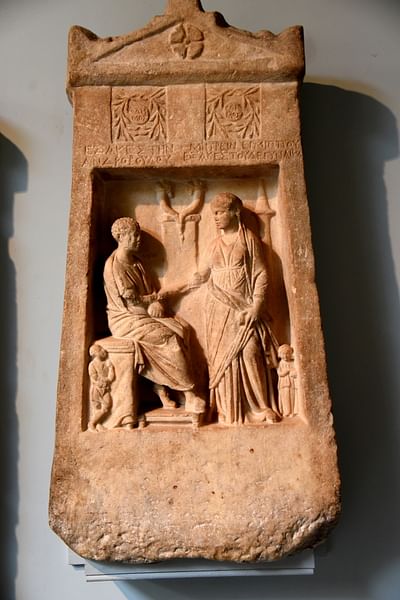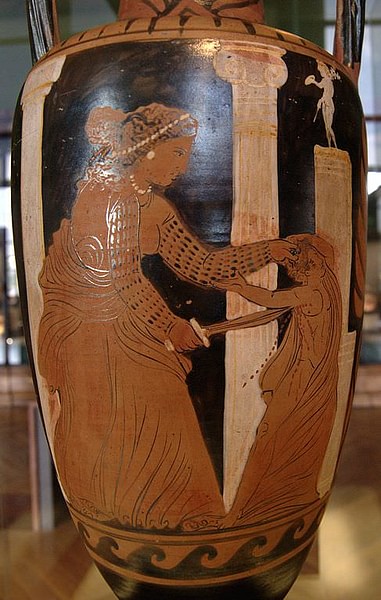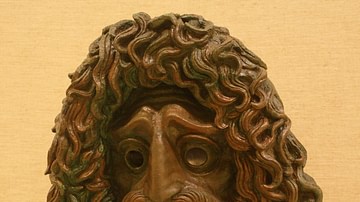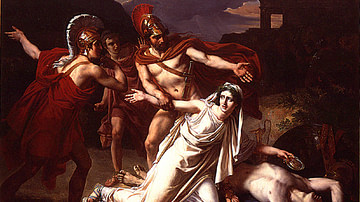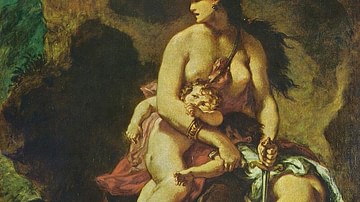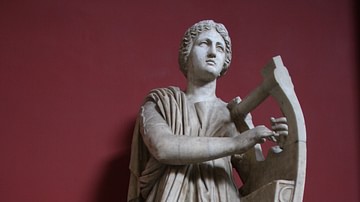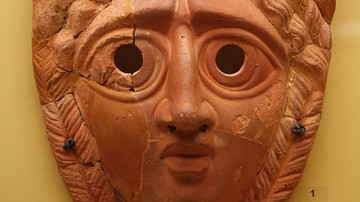When looking at Ancient Greek literature, one can see the importance family plays in Greek culture. We see this displayed in the Greek works Medea by Euripides and Antigone by Sophocles. Throughout these literary works we see that family is a strong and important cultural value which remains undiminished in value throughout Greek history. Even today family remains as vital an aspect in Greek culture as it was in ancient times.
Euripides' Medea
In Euripides' play Medea, the Greek value of family is exemplified in the scene where Helios saves Medea. In the play, Medea's actions would normally cause a god to smite her. Not only did she kill King Kreon and his daughter, but she also killed her own children. Medea says,
This one short day be forgetful of your children
afterwards weep; for even though you will kill them
they were very dear, -O, I am an unhappy woman (Medea, 1221-1224).
Even though Jason was wrong for leaving Medea, Medea was at least as wrong for killing her children. Even though the gods were known to punish people who did such deeds as this, she is still rescued by her grandfather, Helios, the Sun.
An example of a punishment for such a deed would be Tantalus. Tantalus was a son of Zeus who was honored by the gods. He was the only mortal permitted to eat ambrosia and drink nectar (food and drink of the gods) as well as sit at their table on Mount Olympus. However, out of some hatred for the gods, he killed his only son Pelops and served him to the gods so they would be horrified at being cannibals. The gods were aware of his plot and severely punished Tantalus for this crime (Hamilton 346).
They set the arch-sinner in a pool in Hades, but whenever in his tormenting thirst he stooped to drink he could not reach the water. It disappeared, drained into the ground as he bent down. When he stood up it was there again. Over the pool fruit trees hung heavy with pears, pomegranates, rosy apples, sweet figs. Each time he stretched out his hand to grasp them the wind tossed high away out of reach. Thus he stood forever, his undying throat always athirst, his hunger in the midst of plenty never satisfied (Hamilton 347).
The gods punished Tantalus not for only killing his son but for trying to harm the gods with his tricks. Whereas, since he is the son of Zeus, if he had killed his son, but did not try to serve it to the gods for food, he might not have been punished for it. Ultimately he is punished for going against his family, the gods. However, this shows if you go against a family member of a high rank (a god) you will not be spared, because family is important and you opposed that person, that member of the family; unlike Tantalus, however, Medea will be saved.
Medea is saved due to her family connection with Helios:
Why do you batter these gates and try to unbar them
seeking the corpses and for me who did the deed
speak, if you wish. You will never touch me with your hand
such a chariot has Helios, my father's father, given me to defend me from my enemies (Medea, 1292-1297).
This shows that Medea is being saved because she is a relative of Helios. Even though she did kill her sons and upset Helios, a family member in need will not be ignored; especially if one's relative is a deity. When looking at the case, if it were any other person unrelated to a god they would not have pity from the gods. There would then be no reason for a god to save such person; after all, the gods were known to smite ignoble beings rather than rescue them. Medea's actions would be considered dishonorable by the gods. However, family is an important value and concept in this culture. There is no excuse for failing to help out a family member in need, especially if one is a god. This is reason enough for Helios to save Medea, his granddaughter.
Sophocles' Antigone
Another demonstration of the importance of family in Greek culture can be seen in Sophocles' play, Antigone. In this play we see that Antigone is upset because King Creon decreed that Polynices is not to be buried because he is considered a traitor to Thebes. We see that Antigone is willing to break the king's law because she is concerned for her brother, who is more important to her even than the king. When Ismene says, “What? You'd bury him/when a law forbids the city” (Antigone 54), Antigone's response is “Yes! He is my brother and-deny it as you will/your brother too/no one will ever convict me for a traitor" (Antigone 55-58). Antigone then goes on to say, “No, he has no right to keep me from my own” (Antigone 59). This shows that Antigone is determined to bury Polynices because they are family members. Even though the King has made it quite clear that nobody is allowed to bury Polynices, Antigone will not be stopped from honoring her fallen kin, traitor or not. Antigone later tells Creon “I did it. I don't deny a thing” (491). Creon asks in return, “Were you aware a decree had forbidden this” (495). Antigone responds by saying, “Well aware. How could I avoid it? It was public” (496). This piece of dialogue between Creon and Antigone shows that she will not back down and will even openly admit to putting the dirt on Polynices. She put her family as the most important priority even over obeying the law of the king. There is no greater way to say that family is important than to put them first in your life and be willing and ready to lose your life helping out that family member.
Antigone is so determined to give funeral rights to her brother that she is willing to sacrifice her life to do it.
I will bury him myself.
And even if I die in the act, that death will be a glory.
I will lie with the one I love and loved by him-
an outrage sacred to the gods! I have longer
to please the dead than please the living here:
in the kingdom down below I'll lie forever.
do as you like, dishonor the laws
the gods hold in honor (Antigone 85-92).
This shows again that Antigone is more concerned for the care of her brother's body than her life. Part of her argument for burying her brother is that it is a sacred rite that even the gods honor; therefore she must honor that rite as well, especially for her family member. She will not be happy until her brother can rest in peace and make his way across the River Styx, which one cannot do if one has not been given a proper burial.
Conclusion
In considering Ancient Greek literature, family is always recognized as an important factor. It is not always recognized however, that the way one treated one's family was the way one was hoped to be treated by the gods. The concept of eusebia (which we translate as 'piety') regulated interaction between individuals in the community in Ancient Greece. The literature of that culture accurately reflects the importance of this interaction.
